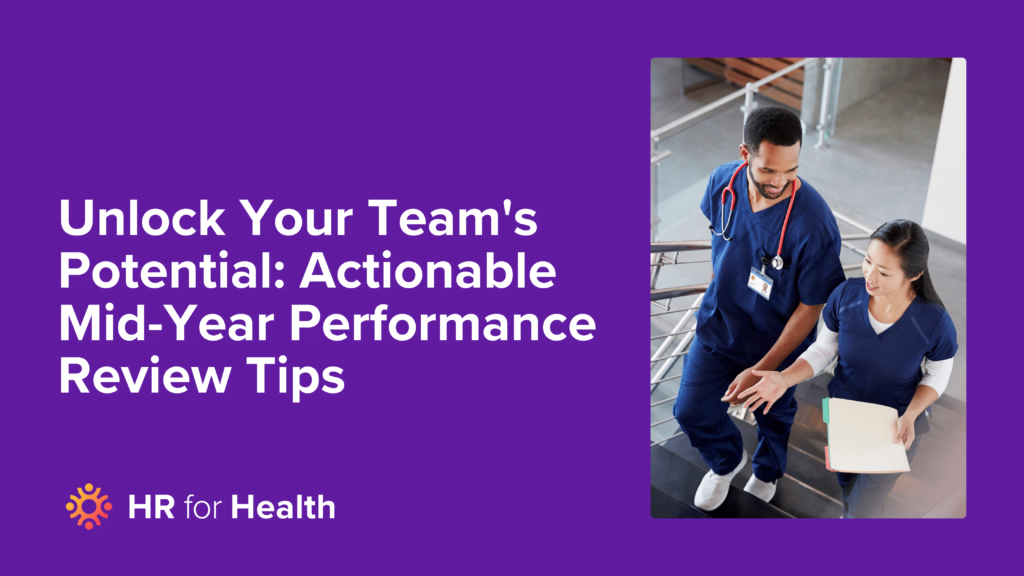In the fast-paced world of healthcare, mid-year performance reviews are crucial for maintaining a high-functioning team. These reviews provide an opportunity to assess progress, deliver constructive feedback, and set new goals for the remainder of the year. Conducting effective mid-year reviews can significantly enhance your team’s performance and overall patient care. Here are some actionable tips to help you maximize the benefits of your mid-year performance reviews, with a focus on leveraging HR for Health software.
1. Set Clear Objectives and Expectations
Start by reviewing the objectives set at the beginning of the year. Assess whether these goals are still relevant and achievable in the context of your healthcare practice. Use HR for Health’s goal-tracking features to ensure that objectives are clearly defined and accessible to all team members.
2. Provide Constructive and Balanced Feedback
Constructive feedback is essential for employee development, especially in a high-stakes environment like healthcare. Focus on specific behaviors and outcomes related to patient care and operational efficiency. Highlight strengths and achievements to reinforce positive behavior, and offer actionable suggestions for improvement. HR for Health’s performance review module allows you to document feedback systematically and track progress over time.
3. Encourage Self-Assessment
Before the review, ask team members to complete a self-assessment. This exercise encourages self-reflection and provides valuable insights into how employees perceive their performance. HR for Health’s self-assessment tools make it easy for staff to evaluate their contributions and identify areas for growth.
4. Celebrate Achievements
Acknowledging and celebrating achievements is a powerful motivator. Recognize individual and team accomplishments, both big and small. Celebrating successes not only boosts morale but also reinforces a culture of appreciation and recognition within your team. HR for Health’s recognition features can help you track and highlight these achievements effectively.
5. Address Challenges and Obstacles
Use the mid-year review to identify any challenges or obstacles that team members are facing. Discuss potential solutions and provide the necessary support to overcome these barriers. HR for Health’s communication tools facilitate open dialogue and help you address issues proactively.
6. Develop a Forward-Looking Action Plan
Collaboratively develop an action plan for the second half of the year. Set new goals and outline the steps needed to achieve them. Identify any training or resources required and establish clear timelines. HR for Health’s action planning features ensure that these plans are documented and monitored, keeping the team focused and aligned with the practice’s objectives.
7. Foster Open Communication
Create an environment where team members feel comfortable sharing their thoughts and concerns. Encourage open dialogue and active listening during the review process. HR for Health’s communication and feedback tools help you maintain an ongoing conversation with your team, building trust and strengthening team cohesion.
8. Monitor Progress and Follow Up
Performance reviews shouldn’t be a one-time event. Schedule regular follow-up meetings to monitor progress and provide ongoing feedback. HR for Health’s performance tracking features allow you to keep tabs on goals and ensure continuous support.
9. Tailor the Review to Individual Needs
Recognize that each team member is unique, with different strengths, weaknesses, and aspirations. Tailor your approach to suit individual needs and preferences. HR for Health’s customizable review templates make it easy to personalize the review process, showing that you care about their development and are committed to helping them succeed.
10. Utilize Technology for Efficiency
Leverage HR for Health software to streamline the review process. Its comprehensive performance management module helps you track goals, document feedback, and monitor progress efficiently. By utilizing technology, you can make the review process more efficient and ensure that nothing falls through the cracks.
Example Performance Review Conversation
Dr. Smith (Manager): “Hi, Lisa. Thank you for joining me today for your mid-year performance review. How do you feel about your progress so far this year?”
Lisa (Nurse): “Thank you, Dr. Smith. I think things have been going well overall, but I do feel like there are areas where I could improve, especially in managing my time during peak hours.”
Dr. Smith: “I appreciate your honesty, Lisa. You’ve done an excellent job with patient care, particularly in ensuring patient comfort and accuracy in your charting. Those are significant strengths. Regarding time management, I’ve noticed that as well. I think incorporating some of the new time-management techniques we discussed during our last meeting could be beneficial. How have you found the HR for Health time-management resources?”
Lisa: “They’ve been helpful, especially the time-tracking feature. It’s given me more insight into where my time goes. I just need to be more consistent with using it.”
Dr. Smith: “That’s great to hear. Consistency is key. Let’s set a goal for you to use the time-tracking feature daily for the next month. We can review your progress in our next follow-up meeting. Additionally, if you have any ideas on how we can support you better, feel free to share.”
Lisa: “Thank you, Dr. Smith. I’ll make sure to use the time-tracking feature more regularly. I think having regular check-ins would also help keep me on track.”
Dr. Smith: “Absolutely, let’s schedule bi-weekly check-ins. Also, don’t forget to document any challenges or suggestions in HR for Health so we can address them promptly. Keep up the excellent work with patient care. Your efforts do not go unnoticed.”
Lisa: “Thank you, Dr. Smith. I appreciate the support and feedback.”
By implementing these actionable tips and leveraging the powerful features of HR for Health software, you can transform your mid-year performance reviews into a powerful tool for unlocking your team’s potential. Effective reviews not only enhance individual performance but also contribute to the overall success of your healthcare practice.


